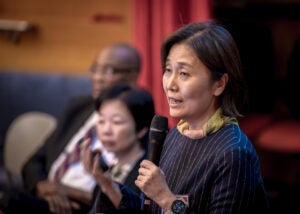Symposium on digital health
At the next day’s symposium, Takemi Program Executive Director Jesse Bump—a fellow in 2010–2011—reflected on the important role the fellowship played in his own career. “The program makes us better versions of ourselves,” he said.
Following their time in the program, fellows join a global cadre of experts who continue to collaborate and support each other.
“The wonderful networks among the fellows beyond national boundaries can be the most important driving force to create a more peaceful, stable, and healthy world with no one left behind,” Keizo Takemi, Taro’s son and a fellow in 2007–2009, said in remarks delivered remotely at the symposium. Takemi was recently appointed Japan’s minister of health, labor, and welfare.

Poster presentation
Talks at the symposium included a keynote address from África Periáñez, co-founder and CEO of Causal Foundry, a company that uses machine learning to personalize medicine, health care delivery, and patient support, especially in low- and middle-income countries. Takemi fellows presented research on a range of topics including uses of mobile technology to address gender-based violence in rural Nigeria, and the role of digital health in Taiwan’s national insurance system. Prakash Gupta, a fellow from the program’s first cohort (1984–85) returned to moderate a panel. Gupta, a distinguished chronic disease epidemiologist, is the founding director of Healis-Sekhasaria Institute of Public Health in Mumbai, India.

(From right) Fellows Minah Kang, Aya Goto, and Friday Okonofua
Yutaka Aso, a member of the Takemi family who runs a large hospital in Japan, said he would be taking back lessons learned at the symposium. “The digital health tsunami is coming,” he said, noting both the opportunities and potential risks in that area.
Original Resources: https://www.hsph.harvard.edu/news/features/takemi-program-40th-symposium/